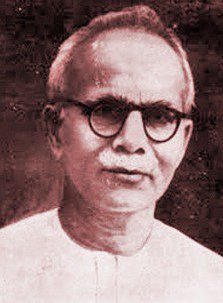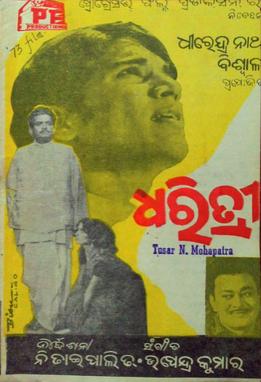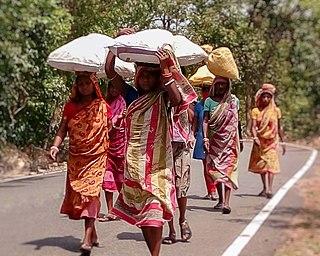Related Research Articles
Das (translation: "devotes of God" is a common last name in South Asia, among adherents of Hinduism and Sikhism, as well as those who converted to Islam or Christianity. It is a derived from the Sanskrit word Dasa meaning servant, "devotee", or "votary". "Das" may be inferred to be one who has surrendered to God. Nowdays it is used in upnaam of Vaishnav.
The Odia (ଓଡ଼ିଆ), formerly spelled Oriya, is a Indo-Aryan ethnic group native to the Indian state of Odisha who speak Odia language. They constitute a majority in the eastern coastal state, with significant minority populations in neighboring Andhra Pradesh, Chhattisgarh, Jharkhand and West Bengal.
The Karan or Karana is a community of scribes found in the state of Odisha in India. The post of Karana used to be a professional designation that was occupied by literate members of the lower as well as the higher castes. They held Karanam post in some parts of Andhra Pradesh, where they speak Odia and played the similar role in Odisha as that of the Kayasthas of West Bengal and Bihar. In the social hierarchy of Odisha they rank next to Brahmins. Traditionally they were the official record-keepers in the royal courts of the Odia princely states. Today they are a politically dominant community and have reigned over the politics of Odisha for 40 years.
Khandayat or Khandait is a landed militia caste from Odisha, East india. They were feudal chiefs, military generals, zamindars, large land holders and agriculturalists. During British raj, they ruled many tributary states in Odisha. They are largest caste by population in Odisha. Historically they originated from Oda & Gauda castes.

Sisir Mishra is an Indian film director and screenwriter best known for directing Hindi and Odia language films including Bheegi Palkein, Samay Ki Dhara, Billoo Baadshaah, TADA and Aseema.
Amari Gaan Jhua (1953) is an Ollywood / Oriya film directed by Binaya Banarjee.
Maa is a 1959 Indian Oriya film directed by Nitai Palit.

Pandit Godabarish Mishra was a poet and notable socialist from Odisha, India. He is known for his contribution to Odia literature.

Pandit Nilakantha Das (1884-1967) was one of the most illustrious sons of Odisha, who appeared both in its political and literary arena at the most crucial period of its history, when Odisha had no political identity in the map of India, and Odia as a language was about to be extinct. He worked relentlessly for Odisha's recognition both politically and linguistically, and helped bring to fruition the dreams of Utkala Gaurab Madhusudan Das, Utkalamani Gopabandhu Das and all other Odia loving people.

Dharitri is a social satire drama in Odia, released on 30 March 1973. It is based on Amulya Kumari Patnaik's novel of the same name. Sarat Pujari, Prashant Nanda, Sriram Panda, Parbati Ghosh and Dhira Biswal acted in key roles.

Shesha Shrabana is a 1976 Odia language Indian movie. It is directed by Prashant Nanda. It stars Prashant Nanda, Mahasweta Roy, Banaja Mohanty and Hemant Das. It is based on a novel of Basant Mahapatra by the same name. In 1979, the film remade as Naiyya in Hindi language by the same director. This film achieved great success in terms of box office and acclaimed by reviewers.

Bandhu Mohanty (1977) is an Odia mythological film directed by Nitai Palit. Gopal Chotrai penned the dialogue of the film.
Kaa is a 1965 Oriya film directed by Siddhartha, which is a pseudonym for Gour Prasad Ghose, Parbati Ghose, & Ram Chandra Thakur. The film is based on Kanhu Charan Mohanty's award-winning literary masterpiece in the same name. The Film glorifies the story of a barren woman, who induced her husband to marry another woman for the sake of the birth of a child.

Stree is a 1968 Oriya film directed by "Siddhartha", which is a pseudonym for Gour Prasad Ghose, Parbati Ghose, & Ram Chandra Thakur.
Chasa is a community from the Indian state of Odisha. Chasas were traditionally cultivators but are now engaged in several professions. The Odia word chasa means farmer. They are third largest caste by population in Odisha. Chasas alongwith Bhuyans are divisions of the Khandayat caste. They also enjoyed the Khandayat Jagiri granted to them by the kings of Odisha. Chasas also served as Paikas in the army.
Kanhu Charan Mohanty was an Indian Odia language novelist who wrote fifty-six novels in a career spanning over six decades from 1930 to 1985. He is considered "one of the most popular and celebrated novelists of Odisa". Mohanty was awarded the Sahitya Akademi Award in 1958 for his novel, Kaa, published in 1956, and was one of the fellows of the Sahitya Akademi. Mohanty died on 6 April 1994 at the age of 87.

Prem Anand is an Indian music director and composer. He usually works in Odia film and television industry. In 2006, he started his career as a music director through the Odia movie Tu Eka Ama Saha Bharasa and worked as a music director in more than 60 Odia films. Apart from Odia films, he composed music for Odia daily shops, Bhajans and Jatra songs. In 2009, Anand worked as a music director for the Hindi film Dekha Bhai Dekh in 2019, he composed music for Bollywood film Luv U Turn. Apart from Odia and Hindi films, he composed music for Marathi and Bengali films.
Parbati Ghose was an Indian actress, film director and film producer. Ghose was the first female filmmaker from the state of Odisha.

Bagal is a cattle herding caste of East India. Bagal people are living in the state of West Bengal, Jharkhand and Odisha. They use Kudmali / Bengali Manbhumi dialect as mother tongue and use Bengali, Hindi and Odia language to communicate with the society.
References
- 1 2 "Parbati Ghose, Odisha's first female filmmaker, passes away". The Hindu . 12 February 2018. Retrieved 7 March 2018.
- ↑ "GourParbati". GPGenterprise.com.
- ↑ "Released by Year » Year 1956". Odia Movie Database. Archived from the original on 16 April 2015.
- ↑ "Bhai Bhai". IncredibleOrissa.
- ↑ Sambit Prakash Dash. Orissa reference: glimpses of Orissa (p-149). TechnoCAD Systems, 2001.
- ↑ Ashish Rajadhyaksha, Paul Willemen (10 July 2014). Encyclopedia of Indian Cinema (p-169). Routledge, United Kingdom. ISBN 978-1135943257.
- ↑ "List Of Odia Movies - 1936 to 2013". nuaodisha.com.
- ↑ Orissa Legislative Assembly. Debates, Part 1, Volume 1, Issues 15-29 (p-25). Government of Orissa, 1961.
- ↑ K. Moti Gokulsing, Wimal Dissanayake. Routledge Handbook of Indian Cinemas (p-65). Routledge, United Kingdom.
- ↑ Cuttack Review of Literature, Criticiscm & Ideas (p-17). S. Patnaik, 1982.
- 1 2 "Songs of Bhai Bhai". OdiaHits.com.